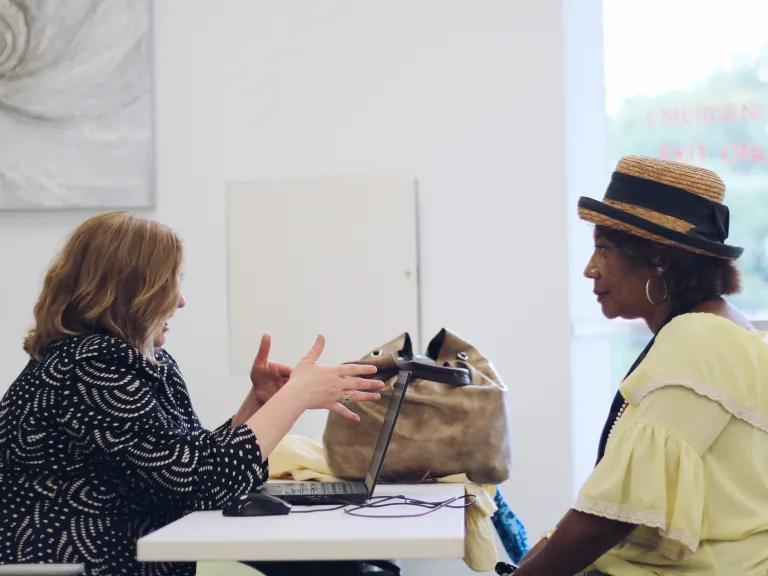Like many organizations, Legal Aid of the Bluegrass (LABG) has faced a unique set of challenges over the past year due to the COVID-19 pandemic. Read on to learn more from my interview with Executive Director, Joshua Crabtree, on how LABG has developed new ways to continue providing high quality legal representation to the Commonwealth’s vulnerable.
What sorts of shifts has LABG undergone in the past 14 months amidst the pandemic?
As an organization, one thing we've always prided ourselves on is being responsive to community needs and being able to pivot. One of the significant shifts was us moving to full remote work within 72 hours. It changed our service delivery model from in-person to remote or virtual based without us ever needing to cease services.
The other shifts are in the types of cases and relief that we’re trying to get to people. Housing is one example. We’ve been preparing for this huge eviction tsunami for over a year that hasn’t materialized just yet. The moratorium keeps getting extended so we haven’t felt the full impact of that. However, we know that time is coming and we have taken each extension as an opportunity to become better prepared.
Another aspect of legal aid that changed during this time is the need to shift toward income instability issues related to unemployment insurance. While income instability has always been a core issue for us there was not always a great need for assistance with unemployment insurance issues. We did a fair number of unemployment cases each year but now we’re doing 500%, maybe 1000% more. We just didn’t do that many before. But now, unemployment insurance issues are an essential part of our services.
A third shift that became more apparent during this time was our role as navigators. There are people who had never needed to use a government program before. And because of the pandemic, this was the first time ever they were having that experience. So there was a definite shift in our role of connecting people with resources and helping them navigate systems.
Which of those shifts do you think are permanent?
I don’t know if office work will ever look the same. This has been the largest disruptor in the lifetime of anybody that’s employed with us right now. I don’t think we’re ever going back to people being 100% in the office all the time.
I also think that we've learned that our clients have the ability to communicate with us in a lot of ways that maybe we didn't always utilize and that there are some definite opportunities for us to connect with people. I think we’ll continue to look at opportunities to expand the ways people can reach us outside of what would have been our traditional model. With Zoom, e-filing, remote court appearances and with our Justice Bus, we can provide representation to people wherever they are.
Does volunteering look any different in a post-pandemic world?
We have seen an increase in need for these navigator roles that provide legal information to people. To use communications as an example, communications has shifted from what was a development role of promoting us within the community to a role of service delivery. It’s “let me get you the information that you need to be able to act on and do what you need to do to better your situation,” and that was not necessarily how communications had factored into legal aid before. So, I think the type of volunteers that we have been able to use has greatly expanded outside of just lawyers because of lessons we learned during the pandemic.
Are you optimistic about the future of LABG and of legal aid generally?
Yes I am optimistic. There is not a type of organization that is better suited for the pandemic recovery than legal aid. We help with the things that people are dealing with most as they try to recover: income stability, housing stability, and personal safety.
The number of people needing our services has grown because of the pandemic, which has resulted in a growing awareness and support for legal aid. So I’m optimistic, I think the future is bright for legal aid. We’re passed an existential threat of existence. We have solidified our role in the judicial fiber of the country now more than ever.
LABG provides free civil legal assistance to underserved communities in 33 counties, primarily focusing on issues related to housing, family, income, public benefits, and health and safety.
Lessons Learned from the COVID-19 Pandemic; An Interview with LABG's Executive Director
Image

May 26, 2021
Need Legal Help
Legal aid protects the rights of people living at or near poverty with legal problems such as: housing, consumer, family and public benefits. We ensure access to justice for all people, including veterans, the elderly, those who are disabled and victims of domestic violence. You can call us at 859-431-8200 to apply for assistance Monday through Thursday 10:00 a.m. – 3:00 p.m. and Friday 10:00 a.m. – 1:00 p.m. Calls are answered in the order they are received. You may also apply online by clicking "Apply For Help" below.

Get Updates by Email
To get the latest news and upcoming events, please subscribe to our newsletter.